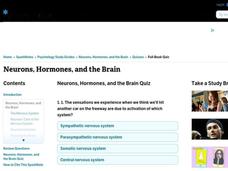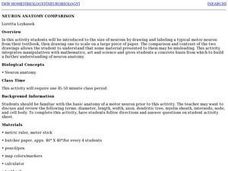Baylor College
What Is a Neuron?
Your class won't get on your nerves while doing this modeling activity! After teaching the structure and function of a neuron using the included diagrams, give individuals some clay and chenille stems so that they can make their own...
University of Minnesota
Virtual Neurons
It's electric! Young anatomists use Virtual Neurons software to build, control, and analyze complex nerve circuits within the body. Colorful and packed with content, class members enjoy interacting with the nervous system at a personal...
Ask a Biologist
Neuron Anatomy Activity
Reinforce the neural connections in the brains of your young biologists with a simple anatomy worksheet. Looking at the provided diagram of a neuron, students are asked to correctly identify and describe the function of each of the six...
University of Minnesota
Bead Neuron
What do you call a skull without neurons? A no-brainer! A hands-on activity asks scholars to build a model of a neuron using beads. They use their models to study the parts of the neuron and their functions.
PhET
Neuron
Neurons send electrical signals throughout a body based on chemical communication. Individuals stimulate a neuron to see the effects. They notice the sodium-potassium channels along with ions, concentrations, and a membrane potential...
Curated OER
Neurons and the Nervous System
The highlight of this series is activitiy #4. Anatomy pupils examine slides of three unknown cells. With the function of the nervous system in mind, they consider the structure of each and try to guess which one is part of that system....
University of Minnesota
Connect the Neurons!
Create a neuron frenzy as your pupils play the part of the neurons. An engaging lesson creates a human chain of neurons that pass cotton balls posing as neurotransmitters. Scholars learn about pre- and post-synapses as they complete the...
Howard Hughes Medical Institute
Electrical Activity of Neurons
How do neurons that don't touch each other share information? Observe electrical activity traveling from neurons and learn what it takes to trigger action potential. A video discusses recent research manipulating neurons, how responses...
Curated OER
The Nervous System
Human biology beginners label colorful diagrams of the neuron, the reflex pathway, and the brain. They list steps in the action potential process, and describe several different neurotransmitters. This worksheet guides learners through...
Curated OER
Role Playing A Neuronal Transmission
Young scholars roleplay to review nerve communication and the parts of the neuron. Each student represents a different part of a neuron and as parts become polarized and depolarized they act it out. A surprise occurs at the synaptic...
Curated OER
Neuron Label
In this neuron worksheet, students are given a diagram of a neuron with the axon, cell body and dendrites. They label 9 parts of the neuron.
Curated OER
Neurons, Hormones and the Brain
In this psychology worksheet, students complete a 10 multiple choice quiz on neurons, hormones and the brain. They identify its different parts and functions.
Scholastic
Study Jams! The Nervous System
Get your class thinking with animations of neurons in action and explanations of how stimuli is transported and processed. This film makes an ideal introduction or review of the nervous system. The parts of the brain and what they...
Curated OER
Neuron Cookie
Find out just how enticing learning about neurons can be by creating models with sugar cookies, icing, and candy. With great background information for you and an easy procedure for the kids, studying cells has never been more fun or...
TED-Ed
How Does Your Brain Respond to Pain?
Zap! Ouch! That hurts! But why? And how come people don't experience or respond to pain in the same way? Take a journey on the sensing pathway, from your nociceptors, along your nerves, up your spinal cord, to neurons and glial, through...
University of Minnesota
Beautiful Brain: Brain Inspiration
"Neuroscientists consider Cajal as important to their discipline as Einstein is to physics." The first of four lessons has scholars view Santiago Ramon y Cajal's drawings of neurons. They reflect and respond to the art through writing...
Curated OER
Neuron Creations
Young scholars examine neurons. In this nervous system lesson, students build models of neurons in order to study their parts and functions.
University of Minnesota
Mirroring Emotions
Do you ever give your class the "teacher look"? Without saying a word, they become silent and engaged (hopefully). How do they know what you're thinking? Explore the concept of nonverbal communication and how it relates to our mirror...
Curated OER
Remember This?
Students investigate the mechanics of an fMRI and the properties of neurons. In this biology lesson, students analyze the way the brain works by performing tests in the neurons in the brain. This is all done theoretically.
Baylor College
Crossing the Synaptic Gap
As part of a unit on the chemistry of the brain, thinkers learn how chemicals work to transmit messages between individual neurons and how controlled substances impact the synaptic cleft. They do so by playing a dice-and-card game in...
Baylor College
Neurotransmitters Contain Chemicals
Human body systems students play a card game, "Locks & Keys" in order to learn that neurotransmitters carry a message from one neuron to another by fitting into a receptor site on the receiving nerve cell. While this activity can...
Curated OER
Neuron Anatomy Comparison
Students create a scale model of a motor neuron that is two hundred times larger than the actual neuron. They identify the structures of a neuron and observe neurons under the microscope then use a worksheet to convert actual sizes into...
Curated OER
Quiz on Neuron
In this neuron quiz activity, students complete an on-line game, clicking on questions and matching answer cards and scoring 1 point per correct answer. Printable version available also.
Curated OER
Recording Electricity in the Brain
In this electricity in the brain worksheet, students read about neurons, electrical impulses, brain activity and EEGs that measure electrical activity in the brain. They answer four critical thinking questions about brain activity.

























